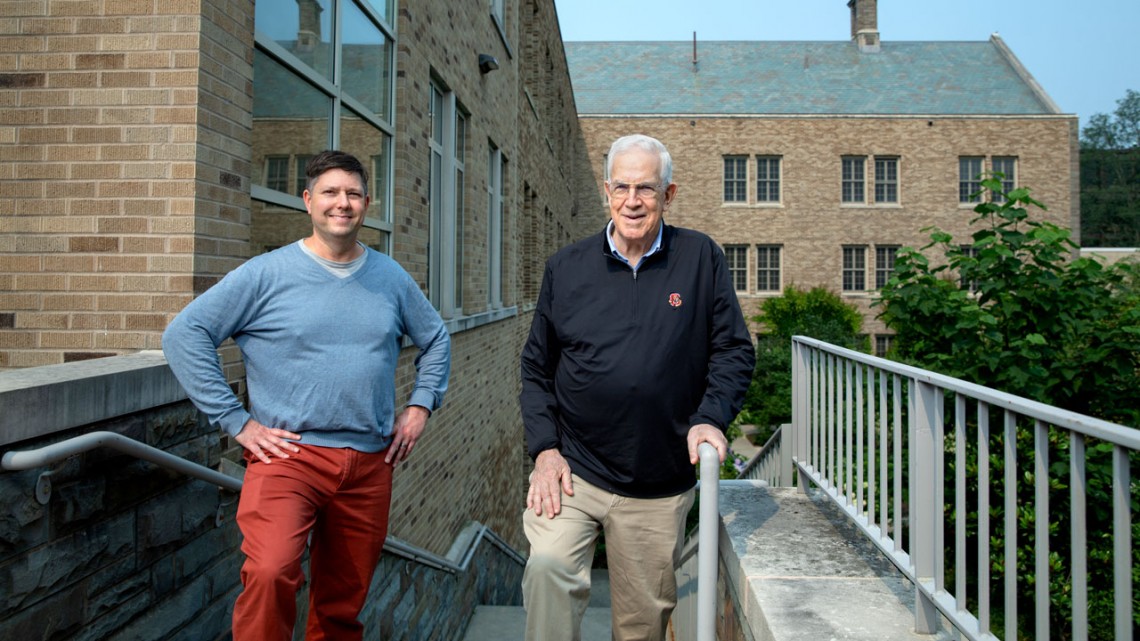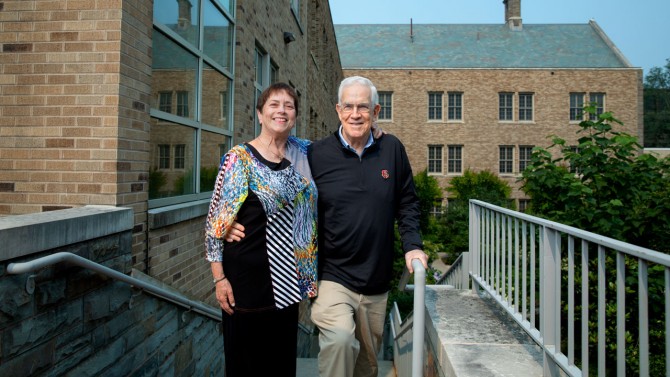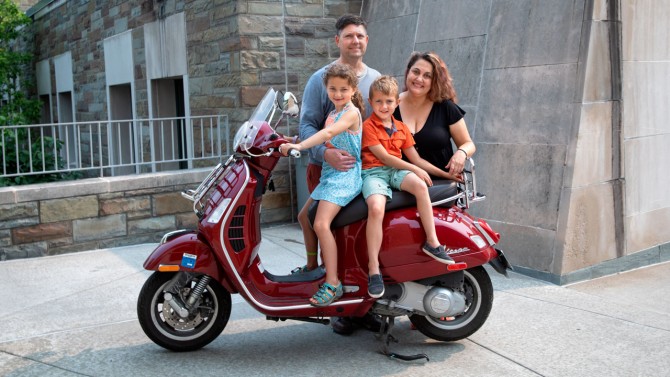
Ron Ehrenberg, right, the Irving M. Ives Professor of Industrial and Labor Relations and Economics, received a kidney from his friend and colleague at the ILR School, associate professor Adam Seth Litwin.
ILR professor gets new kidney – from his colleague
By Tom Fleischman
On June 29, after approximately five years of waiting and of fading hopes, longtime ILR School professor Ron Ehrenberg received a kidney transplant.
Wonderful news, yes – but that’s only half the story.
The kidney came not from a stranger but from his friend and colleague at the ILR School, associate professor Adam Seth Litwin, who spent more than two years secretly improving his health so he could make the donation that changed Ehrenberg’s life.
“In my mind,” Litwin said, “Ron personifies the best of the ILR School and of the university. I would give my heart to this enterprise if I could, so this is about as close I could get.”
For several years, Ehrenberg – the Irving M. Ives Professor of Industrial and Labor Relations and Economics, and a member of the Cornell faculty since 1975 – was living with end-stage renal disease and on a waiting list for a kidney. It’s not an uncommon situation: According to Donate Life America, approximately 85% of people waiting for a transplant need a new kidney, and the average wait time for receiving a kidney from a deceased donor is three to five years.
The nightly peritoneal dialysis treatments were helping to keep Ehrenberg alive, along with the numerous medications and infusions to compensate for the lack of properly functioning kidneys. But, at the same time, they were putting life on hold.
“You’re in this in-between state where your life is completely restricted,” Ehrenberg said. “It took basically 11 hours a day to do the type of dialysis I was doing at home.”
But a phone call and follow-up email he received in late April changed his life.
Two years earlier, Litwin found out that he was a match and could conceivably donate a kidney to his colleague, mentor and friend. But he wanted to improve his overall health before committing to the donation, so he kept his plan a secret.
“Ron knew nothing about this, absolutely nothing,” Litwin said. “I didn’t want to disappoint him if it didn’t work out. And, I needed to make sure that even if I were medically cleared, my family was onboard, too. ”
Claire Litwin, Adam’s wife, admitted to being “surprised, proud and a little scared” by her husband’s decision.
“I never really imagined Adam would be interested in donating, but I think it’s such a valuable thing – obviously for the people who receive an organ donation, but also for society as a whole,” she said. “His act of altruism and generosity reminds us of the good people can do for each other – something we might forget in these divided times.”
On April 20 – coincidentally, Ehrenberg’s 75th birthday – Litwin was given the OK to become a donor. He still needed time to process everything, though, so he remained quiet about it.
Shortly after Litwin got the go-ahead, Strong Memorial Hospital in Rochester, New York, called Ehrenberg to tell him they’d found a living donor. He and wife Randy were about to leave for Washington, D.C., to see their four grandchildren for the first time in 18 months.
“Right when we’re going to leave … we got the call saying they had a live donor and we’re scheduling [transplant surgery] for June,” Ehrenberg said. “And you know, my wife and I basically broke down in tears. We’d been waiting so long.”
He asked his nurse for information about the donor. “All I really wanted to know was the age of the person,” Ehrenberg said.
Once Litwin was made aware that Ehrenberg knew about the living donor, Litwin asked in an email if he and Claire could stop by. Ehrenberg responded, saying they were leaving soon to see the grandkids and could they plan something for after they returned.
Litwin wrote back: “Actually, Ron, I wanted to stop by sooner than later, because I have something I’m excited to share with you. It’s a healthy kidney, and Strong Memorial has tentatively reserved June 29th for me to give it to you. Adam.”
The revelation was overwhelming for Randy Ehrenberg.
“While our children and grandchildren are truly the great gifts of our lives, Adam’s gift of life to Ron is beyond words,” she said. “This selfless, generous and kind act has moved me. Adam, Claire and their children will always be in our hearts.”
The four wound up getting together once the Ehrenbergs returned from Washington, a few weeks before the operation. Ehrenberg considers himself “really, really lucky” to have gotten his kidney, considering how donors and recipients are typically matched up.
“They match up recipients for deceased donors with the age of the person,” said Ehrenberg, who’s about 30 years Litwin’s senior.
Litwin – who admittedly “hates needles” and “has never been poked, prodded and scanned so much” – thinks his desire to give in this manner was a product of his upbringing. His mother told him at an early age that people have two kidneys, but could often live with just one. “Maybe that planted a seed,” he said.
"Years later, I read Marx, who said, ‘From each according to his ability, to each according to his needs,’” Litwin said. “I don’t agree with everything Marx wrote or believed, but at the end of the day, I had two good kidneys, and Ron needed one.”
Litwin also thinks the memory of his mother-in-law, Nancy Schwartz, who died in 2019 after years of chronic disease and to whom he was close, played a role. “It would have been so wonderful if she could have had more time with our kids (then ages 3 and 6),” he said.
That the recipient of his kidney was someone like Ehrenberg, whom he respects and admires, made it more special.
Both men are on the road to recovery; Litwin hopes to be back at work soon, and Ehrenberg will be laying low as his body adjusts. The severe pain after discharge from Strong Memorial waned after a few days, and as he’s weaned off the immunosuppressant drugs, he will be able to resume some activities.
Claire Litwin said most of her fears have subsided, so she can now focus on how proud she is of her husband for his selfless act.
“Obviously, he is at a higher risk for some health issues down the road with only one kidney,” she said, “but he’s made quite an effort to get healthier in preparation for the donation, so I think he could actually turn out stronger for it in the end.”
In another coincidence, the transplant occurred on Ron and Randy’s 54th wedding anniversary. “I now live with great hope that I will share several more decades of life with my best friend and the love of my life,” she said, noting that she can now “hug my husband without a dialysis tube coming between us.”
Ron Ehrenberg feels very strongly that, in sharing his remarkable story, he can make people aware of the need for kidney donors, both living and deceased.
“I waited for five years, and I probably would have had to wait for another half a year or a year to get a deceased-donor transplant,” he said. “And during the time potential recipients are waiting for a transplant, the people’s lives are completely on hold, and some of them actually don’t make it.”
Learn more about kidney donation on the American Kidney Fund website.
Media Contact
Get Cornell news delivered right to your inbox.
Subscribe


